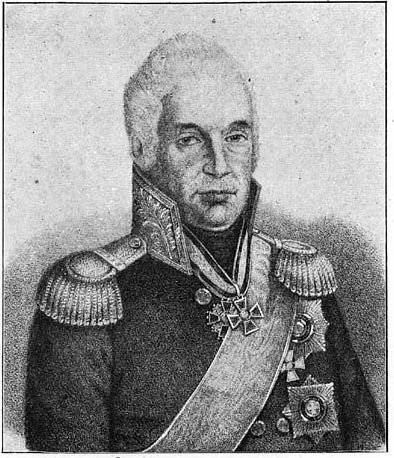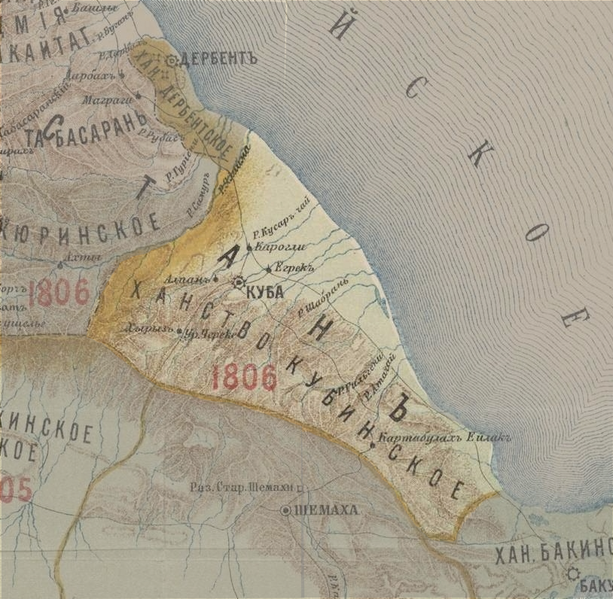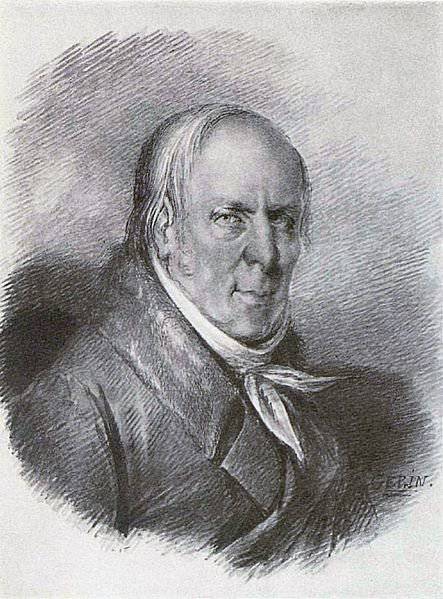Conquest of Derbent, Baku and Cuban Khanates in 1806
In such circumstances, demanded a firm hand, which could take decisive action to seize the initiative in their hands. It was necessary to show the strength of the Russian state and punish the Baku Khan for treachery. Fortunately, such a person was found before the arrival of the new commander in chief. Troops on the Caucasian line commanded by General Grigory Ivanovich Glazenap (1751 — 1819). He came from a German noble family. Began service with 13 years in the 3 Grenadier Regiment. Moved up the corporate ladder slowly. He spent about six years in the lower ranks, only at the beginning of 1770 was promoted to ensigns in the Simbirsk Musketeer Regiment. Took part in the war with Turkey 1768-1774. In 1773, the city of Glazenap, he was transferred to the Leib-Cuirassiers Regiment and after the end of the campaign he received the rank of captain. Distinguished in the second Turkish war 1787-1792. For the difference in several cases, Glazenap was promoted to prime minister, and in October 1792 was promoted to lieutenant colonel.

Grigory Ivanovich Glazenap.
In the reign of Emperor Paul, after almost 30-year service in the officer ranks, Glazenup began to rise. He was promoted to colonel, and then to major general. In 1803, he was appointed commander of the Caucasian line. In his letters from the Caucasus, Glazenap very well describes both the state of affairs in the region and the spirit of the highlanders themselves. The mountaineers "peace means timidity and weakness," and they "know no honor, no conscience, no pity." To the inhabitants of the region, "philanthropy and amnesty do not produce anything good: they take it as a sign of weakness and cowardice." “The war,” according to the general, “was not dangerous for the regiments and detachments, but disastrous for soldiers and Cossacks, who dared to secede one by one for some sort of need.” Therefore, service on the Caucasian line demanded "timeliness, skilled riflemen, riders and the lightest artillery, along narrow mountain paths, conveniently carried."
The first important task that Glazenap carried out on Tsitsianov’s instructions was to pacify the Kabardians, who slaughtered Cossacks at the Belomechetskaya post and constantly alarmed the guard posts. In May, the 1804, the general, marched from the village of Prokhladnaya with a detachment of 1750 men of infantry, dragoons and Cossacks. After several clashes, the enemy was defeated, and fled to the mountains, the fortified auls were burned. Soon the owners of the Great Kabarda came to Glazenapu with a request for mercy and expressed complete obedience. In June, Glazenap again pacified the Highlanders and in August he was granted the Order of St.. Vladimir 2 degree. In the winter of 1804-1805. General won a new victory over the highlanders and was awarded the Order of St.. Anna 1 degree with diamond marks. Simultaneously with the suppression of the mountaineers, Glazenap had to war with another enemy - the plague, with a number of energetic measures he stopped the development of the disease.
Conquest of Derbent, Baku and Cuban Khanates
Glasenap, after the death of the commander in chief of the region, Prince Tsitsianov, took power and, despite all the difficulties, successfully ruled the Caucasus until the arrival of a new governor, Count Gudovich. He ordered the generals to prepare detachments to repel the invasion of Persian troops, and he decided to strike at Derbent and Baku. The purpose of the campaign was kept in secret and communicated by the general to only two or three persons. At the same time, he ordered the Caspian flotilla with food and siege artillery was at a certain time on the raid of Derbent.
At the end of April 1806, the Glazenap detachment crossed the border and stood for about a month in a camp near the Dodruchkov post to prevent the invasion of Georgia by Kazikumukh Khan and protect the left flank of the Caucasian line. 3 June Glazenap made at Derbent. As they approached the city, the townspeople became agitated; they did not want to fight for Khan. Soon a riot broke out, and the Khan fled from Derbent. On June 21, a city delegation arrived at Glazenapu camp at Kutzu and declared submission. 23 June General took the keys to Derbent, the townspeople were sworn to the emperor Alexander Pavlovich. With this act, Glazenap restored respect for Russian power, and preparing the ground for future success. Residents of the cities of Cuba and Baku brought confession and expressed readiness to accept Russian citizenship. During the occupation of Derbent, General Glasenap received a diamond snuffbox and a pension in 3 thousand rubles.
The units sent against the Persians also acted successfully. In particular, Petr Fedorovich Nebolsin, commanding a detachment that moved to Karabakh, defeated the troops of Abbas-Mirza. 8 June 1806 of the year, while moving from the Shah-Bulakh fortress to Askaran, and 14 June at the river Khanashin, Nebolsin's squad (1600 soldiers) defeated 20-thousand. Persian army under the command of Abbas Mirza. The batteries and fortifications arranged by the Persians were destroyed, the troops of the Persian prince were pushed aside from the Karabakh region. Persian troops were forced to retreat across the Araks River. In addition, Russian troops repelled the attacks of Hussein-Kuli-Khan and Tsarevich Alexander from Erivan, directed against Tiflis and Elizavetpol.
A new commander was appointed to the position of the deceased Prince Tsitsianov Ivan Vasilievich Gudovich (1741 - 1820), Honored Veteran, well known in the Caucasus. Gudovich distinguished himself in the Russian-Turkish wars 1768 — 1774 and 1787 — 1792. In 1791, he took by storm "Caucasian Ishmael" - Anapa (Storming "Caucasian Ishmael"). He commanded the Caucasian line twice - in the reign of Catherine II and Paul. However, old age and the time spent in inaction (since 1800, retired) did not have the best effect on the activities and character of the new commander in chief. He retained the same energy, but became, according to his contemporaries, irritable, capricious, it developed vanity and self-reliance, supported by previous successes and victories. In Tsitsianov's activities, he saw continuous mistakes. The new commander in chief, who had not loved Glazenap for a long time, removed him from command, despite his successes.
Gudovich took a heavy legacy. Tsitsianov died, not having time to consolidate their successes. Bad news came from Georgia: the Imeretian king Solomon rebelled openly, the Akhaltsykh Pasha patronized the Lezgins' raids that had begun on the Georgian lands. All of the Caucasus was ready to rise. Ossetians were worried. The Zakuban highlanders and Kabardians, taking advantage of the absence of Russian troops on the Caucasian line, made daring raids up to Stavropol. The Persian Empire was preparing a new army, preparing to recapture Karabakh, Ganja and other possessions.
Gudovich, who thought that his previous successes were still memorable in the Caucasus, wrote proclamations, gathered representatives of the tribes. The mountaineers were given gifts, they promised to live in peace, but returning home, they began to take on the old “craft” - predatory raids, the seizure of people for sale. The situation was more successful in Dagestan. General assigned to Glazenap Sergey Alekseevich Bulgakov successfully continued his mission. Bulgakov was the hero of the assault on Anapa in the 1791 year, along with Gudovich much contributed to the organization of new villages along the Caucasian line and the relocation of Don Cossacks to these places. At that time he was the commander of the right flank of the Caucasian line. During the Persian campaign 1796, he, under the command of Zubov, distinguished himself during the capture of Derbent, occupied Baku and Cuba. Since 1801, he was retired and was called up for service in 1806, at the request of the commander-in-chief in the Caucasus, Count Gudovich, and was promoted to commander in the Caucasian line.
By order of Gudovich, Bulgakov moved to Baku to punish the city for the murder of Prince Tsitsianov. Approaching the city, the general offered the Bakuvians to surrender, relying on the sovereign's mercy, otherwise he threatened to destroy Baku to the ground. Khan fled from Baku. The townspeople met Bulgakov a few miles from the city walls and handed him the keys to Baku. October 3 1806, the Russian troops occupied the city. The remains of Tsitsianov solemnly transferred to the Armenian church. After some stay in Baku, Bulgakov left the garrison in the city and moved to the Cuban khanate. The Cuban ruler Sheikh Ali Khan fled to the mountains, city residents did not resist and in November 1806, they took the oath of allegiance to Russia.

Cuban Khanate on the map of the Caucasus region with the designation of the boundaries of 1806,
Thus, thanks to the decisive actions of Glazenap and Bulgakov, the Derbent, Baku and Cuban khanates were included in the Russian Empire. Bulgakov received an order to strike the mountaineers of Chechnya, but during the return movement his detachment suffered great hardships because of the cold and other troubles of troop movements in the winter in the mountains. Therefore, Bulgakov could not immediately hit the highlanders. He entered only in spring 1807 of the year. And after a fierce battle, he occupied the Khankal gorge, opening the way to the very heart of Chechnya.

Ivan Vasilievich Gudovich.
The pacification of Shchekinsky Khanate
The defeat of the Persian troops did not infuriate the Sheki khan, who did not want to remain in Russian citizenship, after his friend and relative of his, Ibrahim-khan Karabagsky, was killed by Lisanevich. Selim as a revenge for Ibrahim, decided to seize Major Parfenov, the commander of the garrison in his possession. To this end, he invited Parfenov to himself under the guise of a meeting. The collection of troops of the Khanate, he explained the emergence of Persian troops near the borders. Parfenov's small escort was partly killed, partly chained and thrown into prison, like the major.
Khan did not dare to execute Parfenov, agreeing to let him go if he took the Russian troops out of his possessions. Parfenov was forced to agree. The uprising of the ruler of Nuhi led to a riot of the Jaro-Belokan societies. The Shaki army and the Jaro-Belokans prepared for the invasion of Georgia. Gudovich lay ill in Vladikavkaz at that time, but ordered him to be delivered in a stretcher to Tiflis and ordered Nebolsin to immediately strike the enemy.
Nebolsin fulfilled the task brilliantly. Selim's troops were defeated. Russian soldiers laid siege to the capital of the Khanate, Nuhu. Nebolsin suggested that the khan be guilty. Selim refused to give up. Nebolsin decided to go for an attack. The besieged surrounded their fortifications with combustible materials and when the Russian wax went on the attack, they lit them. The city was surrounded by a fiery streak, but this did not stop the Russian soldiers - they broke through the fire. They took Nuha, but Khan was able to escape. He was deprived of all possessions. After the capture of Nukhi, Nebolsin and the commander of the Alazani line, Prince Dmitry Orbeliani, they launched an offensive and squeezed all the Lezghin forces, along with the Avars who came to their aid, in the close Jar gorge. Avar Khan entered into negotiations and led the troops to the mountains. Dzhartsy were forced to obey and their deputies were sent to Tiflis. They entered the city with sabers hung around their necks, arousing the delight of the townspeople.
Unfortunately, Gudovich, instead of merging all of Transcaucasia under one common Russian power, having appointed Russian managers to subordinate lands, retained the power of local rulers. Khanate Derbentskoe and Cuba were transferred under the rule of Shamkhal Tarkovsky. Jafar, a Persian from Persia, was imprisoned in Nukha, Mehdi Quli Khan - in Karabakh.
With the pacification of the Lezghins, the 1806 campaign of the year was completed. The beginning of the war with Turkey forced the Russian command to conclude the 1806 — 1807 in the winter with the Uzun-Kilissa truce with the Persian state. The position of the Russian commander-in-chief in Transcaucasia during this period was very difficult: the Ottoman empire concentrated considerable forces on the border, and Gudovich had only one division, dispersed around the edge.
Information